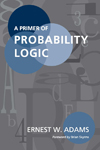Ernest W. Adams
This book is meant to be a primer, that is, an introduction, to
probability logic, a subject that appears to be in its
infancy. Probability logic is a subject envisioned by Hans
Reichenbach and largely created by Adams. It treats conditionals as
bearers of conditional probabilities and discusses an appropriate
sense of validity for arguments such conditionals, as well as
ordinary statements as premises.
This is a clear well-written
text on the subject of probability logic, suitable for advanced
undergraduates or graduates, but also of interest to professional
philosophers. There are well-thought-out exercises, and a number of
advanced topics treated in appendices, while some are brought up in
exercises and some are alluded to only in footnotes. By this means,
it is hoped that the reader will at least be made aware of most of
the important ramifications of the subject and its tie-ins with
current research, and will have some indications concerning recent
and relevant literature.
The new printing (2016) of this book makes corrections to several tables and the expansive bibliography in order to create a more complete and accurate version of the text.
Errata for the previous printing
Ernest W. Adams (1926–2009) was Professor Emeritus of Philosophy at the University of California, Berkley, and fellow of the American Academy of Arts and Sciences.
- Forward
Brian Skyrms
- Preface
- 1 Deduction and Probability: What Probability Logic Is About
- 1.1 Deduction and Certainty
- 1.2 Inference and Probability Change: Nonmonotonicity
- 1.3 Conditionals
- 1.4 Decision and Action: The Advantage of Being Right
- 1.5 Summary and Limitations of This Work
- 1.6 Glossary
- 2 Probability
- 2.1 Logical Symbolism and Basic Concepts
- 2.2 Fundamental Connections between Logic and Probability
- 2.3 Probability Functions and Algebra
- 2.4 Deductive Theory of Probability
- 2.5 Probabilistic Independence, Symmetry, and Randomness
- 2.6 Uncertainty and Its Laws
- 2.7 Glossary
- 3 Deduction and Probability Part I: Statistics
- 3.1 Introduction
- 3.2 Two Hauptsätae of the Theory of Uncertainty Accumulation
- 3.3 Reinforcing Conclusions by Introducing Redundancy among Premises: Degrees of Essentialness
- 3.4 Remarks on Defaults and Other Assumptions That Limit Conclusion Uncertainties
- 3.5 Glossary
- 4 Conditional Probabilities and Conditionalization
- 4.1 Introduction: The Dependence of Probabilities on States of Knowledge
- 4.2 The Formalism of Conditional Probability
- 4.3 The Chain Rule: Probabilistic Dependence and Independence
- 4.4 Ersatz Formulas and Truth Values
- 4.5 Probability Change and Bayes' Principle
- 4.6 On Induction
- 4.7 Induction and Symmetry
- 4.8 Critique of Bayesian Epistemology
- 4.9 Glossary
- 5 Deduction and Probability Part II: Dynamics
- 5.1 Introduction
- 5.2 Deductive Dynamics, General
- 5.3 Nonmonotonicity and Scope: The Two-premise Case
- 5.4 What Follows from a Contradiction
- 5.5 More General Inferences
- 5.6 Defaults: The Logic of Conversation Again
- 5.7 Posterior Premise Uncertainty
- 5.8 Glossary
- 6 Probability Conditionals: Basics
- 6.1 Introduction
- 6.2 The Paradoxes of Material Implication
- 6.3 Intuitive Analysis of Other Inference Patterns
- 6.4 Probabilistic Validity
- 6.5 Order-of-Magnitude Orderings and Distributions
- 6.6 Enthymemes and Other Defaults
- 6.7 Problems of Inferential Dynamics
- 6.8 Glossary
- 7 Formal Theory of Probability Conditionals: Derivations and Related Matters
- 7.1 Aspects of Derivation: Basic Definitions and Equivalences
- 7.2 Rules of Conditional Inferences
- 7.3 Derived Rules of Inference: Shortcut Derivations
- 7.4 Quasi-conjunction
- 7.5 An Ersatz Truth-table Test of Probabilistic Validity
- 7.6 Validity and Completeness with Sketches of Their Proofs
- 7.7 Other Aspects of Metatheory
- 7.8 P-tautology, Equivalence, and Consistency
- 7.9 On Probabilistic Certainty Formulas
- 7.10 Glossary
- 8 Truth, Triviality, and Controversy
- 8.1 Problems, and Some History
- 8.2 Truth-functionality
- 8.3 Truth-conditionality: Stalnaker's Theory
- 8.4 The Problem of Probability
- 8.5 Triviality Results
- 8.6 The Controversy about Truth: Theories of Truth
- 8.7 Glossary
- 9 Practical Reason
- 9.1 Introduction
- 9.2 Practical Inferences: A Qualitative Representation
- 9.3 A Pragmatic Principle
- 9.4 Decision Matrices
- 9.5 The First Generalization: Degrees of Confidence and Utility
- 9.6 Critical Degrees of Confidence
- 9.7 Measuring Confidence and Utility
- 9.8 Decision Making in the Nonindependence Case
- 9.9 Unorthodox Reflections on Practical Proababilities
- 9.10 Glossary
- A1 Coherent Degrees of Confidence: Axiomatics and Rational Betting Odds
- 1.1 Introduction
- 1.2 The Axiomtic Approach
- 1.3 Rational Betting Odds and Dutch Books
- 1.4 Dynamical Dutch Books
- 1.5 Critique
- A2 Infinitesimal Probabilities and Popper Functions
- 2.1 Introduction
- 2.2 Two Objections to the Stipulation
- 2.3 Intuitives Infinitesimals and Non-standrad Probabilities
- 2.4 Popper Functions
- A3 David Lewis's Triviality Results
- 3.1 Introduction
- 3.2 The Results
- 3.3 A Way Out
- 3.4 Discussion
- A4 The Problem of Embedded Conditionals
- 4.1 Introduction
- 4.2 Some Partial Theories
- A5 A Geometrical Argument for the ‘Statistical Reasonableness’ of Contraposition
- A6 Counterfactual Conditionals
- A7 Probabilistic Predicate Logic
- 7.1 Introduction
- 7.2 Language, Worlds, and Probabilities
- 7.3 Probabilistic Validity
- 7.4 Dynamics and Scope of Universal Statements: Confirmation
- A8 Probabilistic Identity Logic
- 8.1 Generalities
- 8.2 Complications: Connections with Frege's Puzzle
- A9 Approximate Generalizations
- 9.1 Introduction
- 9.2 Approximate Monadic Generalizations
- 9.3 Multi-variate Approximate Generalizations
- 9.4 Generalizations and Conditionals: Degrees of Truth and Probability
- Answers to Selected Exercises
- References
- Name Index
- Subject Index
12/31/1996


